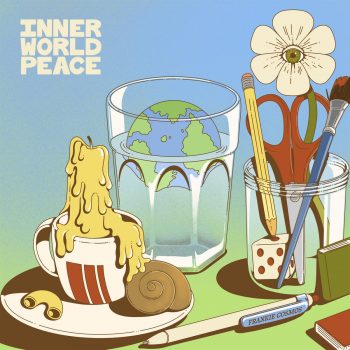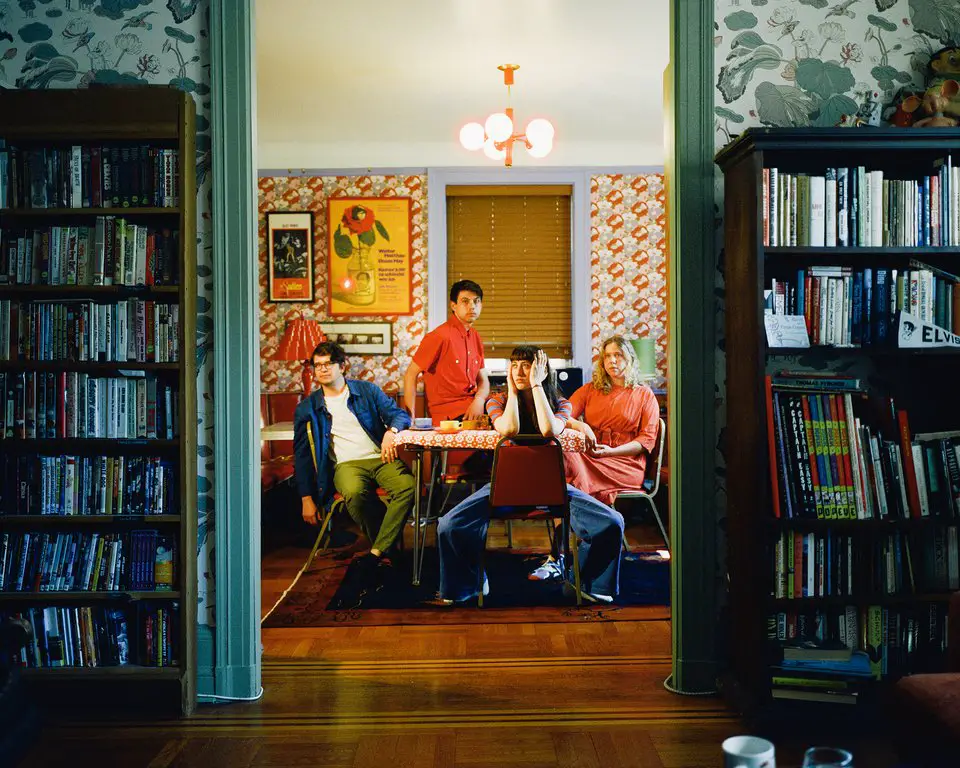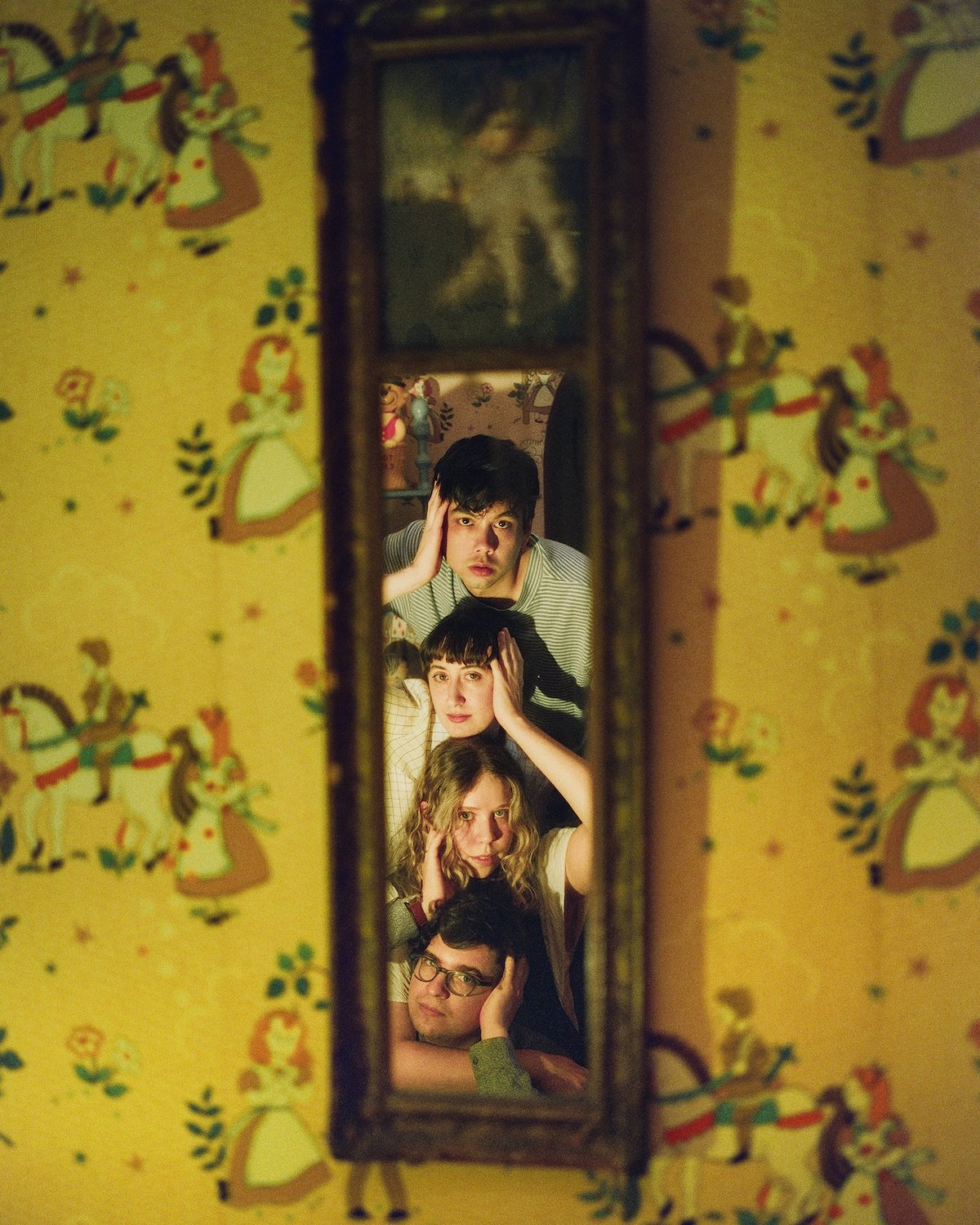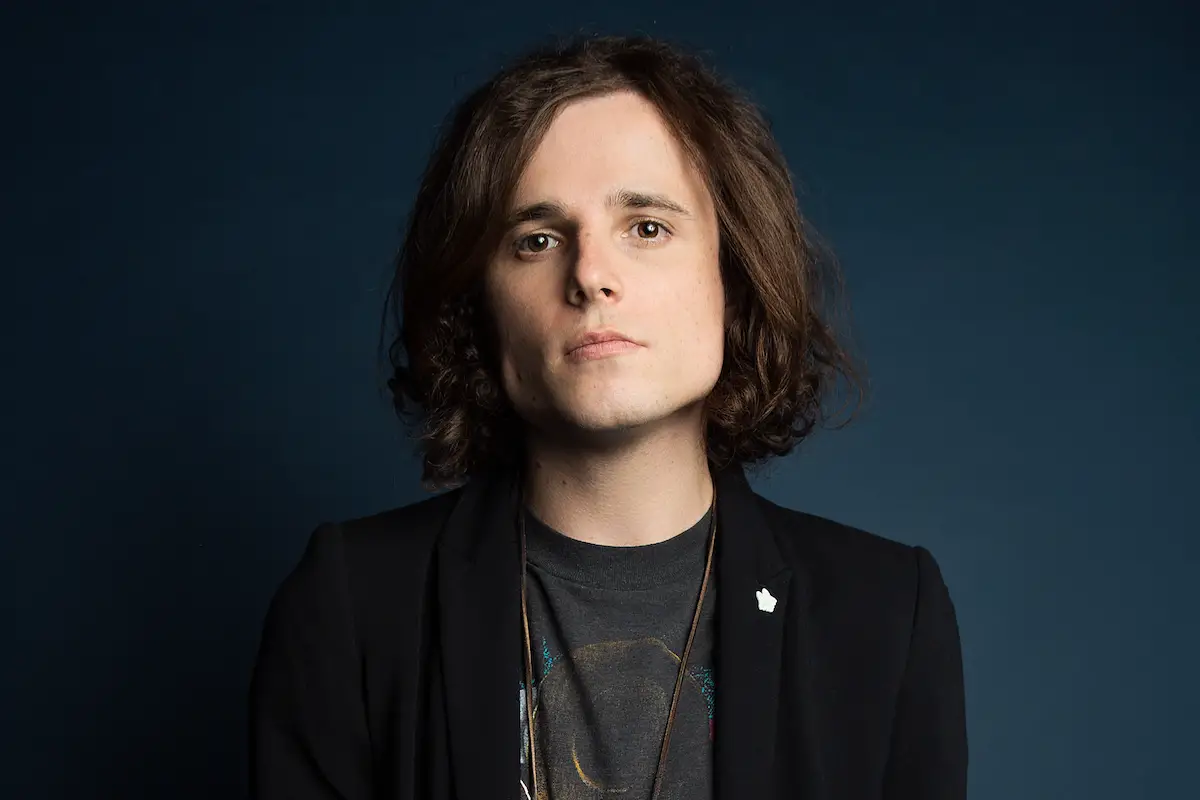Frankie Cosmos delve into a space of self-reflection in the band’s fifth record, ‘Inner World Peace,’ enveloping listeners in a dreamy analysis of perhaps the most important relationship of all: Our relationship with ourselves.
Stream: ‘Inner World Peace’ – Frankie Cosmos
I like the concept of your inner world being a manageable place to try and start finding peace.
While it has been highly contested by many, the belief that you can’t love someone until you love yourself does indeed have some truth to it.
Love starts within oneself, and in order to spread this love to the periphery, we must first nurture it on the inside and make the effort to know ourselves before we can attempt to deeply know another. Alternative-indie rock band Frankie Cosmos does just this in their newest record, Inner World Peace, released today (Oct. 21, 2022) via Sub Pop.

While the band has been on a hiatus since the beginning of the COVID-19 pandemic, frontwoman Greta Kline’s compositions sound as fresh as ever. Her quirky musical roots bleed through the 15 tracks of this bona-fide indie pop-rock opus; the old Kline seamlessly melding into the new.
And though the music of Frankie Cosmos is mainly the brainchild of Kline, the project would not be complete without drummer Luke Pyenson, keyboardist Lauren Martin, and bassist Alex Bailey rounding it out. The four have been playing together under the cosmic byline for years upon years, and after 500 days of not seeing one another during the pandemic, they regrouped to begin working on Inner World Peace; a process that Pysenson claims felt “euphoric.”
“We all stayed together in a big house while arranging this, so it just felt like all of us hanging out together, having fun, and making music. Which is exactly how we wanted it to feel,” Pyenson exclaims. A sense of pure play is more than obvious within the context of this record — never before has Frankie Cosmos sounded more cohesive in the diversity of their sound. The band’s staple indie rock sensibilities fluidly meld into punchy punk sounds, lending themselves to a bit of a psychedelic ambience as well — all of the textures working in tandem to set this fresh new foundation in place.
In addition to providing ample room for artistic experimentation, Kline shares that the band has “created a safe space for each other to have deeply internal understandings of our needs. To be allowed to want things that are not normal, and try to create the world we want to live in.” Their process not only consists of collaborating musically after Kline brings her compositions to the group — according to Pyenson, the four have promised “to always be open and honest with each other, and not hold on to what we in the band call ‘gargar,’ or grievances. We have a formal process for ‘airing gargar’ which is essential to our wellbeing as a unit.”
In times of uncertainty (or, as the band puts it, immense “gargar”), there is more room than ever for experimentation. Nothing makes sense. Nothing is linear — so why not take advantage of it?
Kline spent months on end during quarantine piecing through her life, penning the songs that now find themselves neatly packaged in the gift that is Inner World Peace. The musician’s perception of herself and her own humanity had shattered, and she was now looking at herself through a refracted mirror — writing the tracks on this album were her go-to way of sorting through this fragmented perception of herself. For Kline, time is a living, breathing entity that does not exist in a linear pathway; the Kline of the past Kline and the Kline of the present meet in the middle and engage in reflective dialogue. And while Kline might not ever be able to fully comprehend her own sentience in its entirety, there is immense beauty in being in a state of continuous self-discovery.
Throughout the duration of the album, Kline tussles with query after query, progressively getting more confused by every new thought that crosses her mind. Though, being lost in a state of profound introspection doesn’t frighten her; Kline instead sees it as an encouraging challenge. “A lot of this album feels very isolated and internal,” Kline says, “I like the concept of your inner world being a manageable place to try and start finding peace.” And thus, Kline bravely embarks on this — at times arduous, but every so rewarding — process of exploring the answers to the age-old question that every human has asked themselves at one point or another: “who am I?”

Even when caught up in the frenzy of her whirling thoughts, Kline’s outlook remains bright.
From the delightfully bright “Prolonging Babyhood” to the mesmerizingly ambient “Empty Head,” Kline’s songwriting soars to new heights, packing more oomph than any of the band’s past releases. Each track holds lyrics peppered with sarcasm; every musical phrase assists her sing-song rhetoric in painting a vivid story for listeners to engage with. The effervescence that Kline leads her life with seeps into her discography — “beauty is everywhere, and it’s really important to me to notice it,” Kline states — and thus, even the most melancholy track on this project does not come without a silver lining.
“Music reaches a deep part of peoples’ souls,” Kline asserts. “It can be a magical form of communication. We sing in our heads as we walk down the street. Listening to music can be meditative. You can get something from a song that maybe isn’t related to what the artist is ‘trying to say.’ You can feel seen and less alone; a song can feel like a friend.”
The narratives that Kline weaves not only apply to her own experiences, but to the world at large. While her introspection and contemplation over her own life is abundant, the lessons that she learns within the 15 tracks can be applied to anyone’s existence. With the lilting melodies of Inner World Peace, Frankie Cosmos provides us with the time to look inward before we set our sights on tackling the world outside.
Continue reading below to uncover the various stories behind the making of Inner World Peace!
— —
:: stream/purchase Frankie Cosmos here ::
A CONVERSATION WITH FRANKIE COSMOS

Atwood Magazine: For starters, how does it feel to have the release of Inner World Peace right around the corner?
Greta Kline: Good, I’m excited to share it with everyone, and really enjoying the release process.
How did the title of the record come to be, and how does it play into the album and those ideas and feelings you experienced while making it?
Greta Kline: I was just doodling and I wrote it down. A lot of this album feels very isolated and internal; I like the concept of your inner world being a manageable place to try and start finding peace.
Your early music career was highly nurtured by the DIY music scene — in what ways did creating music in that environment inform your development as a musician from then to now?
Greta Kline: Growing up participating in a DIY scene gave me an understanding that many people coming together to make music (events, releases, etc) happens. Creatively, it inspired me to just be myself and not make music with any kind of larger goal than sharing it with friends. I have held on to that ethos for dear life!
The Frankie Cosmos soundscape is ever-changing, but what elements have remained staples within your discography? How does one know that a song is a Frankie Cosmos song?
Greta Kline: Hmm, I think it’s just a vibe? One thing that feels pretty consistent is that the rhythms of the songs are often built around lyrics.
Luke Pyenson: You could put almost any type of music underneath Greta singing and it would be unmistakably Frankie Cosmos.
As a band, you all entered a brief hiatus from releasing music during the pandemic. How did it feel to come back together and collaborate again in the making of this record?
Greta Kline: it felt so good to play in a room together after like, 400 days apart. I think the sound of this record comes from us just being so excited to play.
Luke Pyenson: Euphoric.
After all these years of working together, what’s the most important thing that you have learned from each other?
Greta Kline: We have created a safe space for each other to have deeply internal understandings of our needs. To be allowed to want things that are not normal, and try to create the world we want to live in.
Luke Pyenson: To always be open and honest with each other and not hold on to what we in the band call “gargar,” or grievances. We have a formal process for “airing gargar” which is essential to our wellbeing as a unit.

In the industry today it seems as though you have to be constantly churning out content or you’ll fall behind — of course, not everyone operates this way. How do you maintain a peace of mind and a sort of authenticity within an industry that thrives off of image and facades?
Greta Kline: The content machine is very scary to me. I try to just be human, and share that and connect that way. I wish the music could just stand for itself, but there’s seemingly an unavoidable element of endless self-marketing and reminding people you exist.
Luke Pyenson: As Greta’s bandmates we’re so thankful she doesn’t really play the game or force us all to. We’re so lucky to be on the same page in prioritizing the music above everything else. That being said, I don’t have TikTok and I don’t know what she does on there…
On Instagram you stated that this “album was derived in collaborative environments that rely on trust, clowning/playing, and joy.” How do you create a safe environment for this experimentation and playful collaboration to flourish?
Greta Kline: We’ve just known each other a long time, and I think we’re not afraid of seeming stupid to each other. For example, I don’t think I could have written my favorite part of Aftershook (the guitar solo midway through) if I didn’t let myself just act really joyfully stupid during band practice.
Luke Pyenson: We all stayed together in a big house while arranging this, so it just felt like all of us hanging out together, having fun, and making music. Which is exactly how we wanted it to feel.

From your early days as Ingrid Superstar to now as Frankie Cosmos, your projects have always adeptly explored subjects that reach out to people, uniting them under their universal experiences. Inner World Peace is no different, as it is full of themes that many have felt in this life — love, loss, regret, etc. — what do you believe makes music such a good vessel for these emotions and experiences?
Greta Kline: Music reaches a deep part of peoples’ souls, it can be a magical form of communication. We sing in our heads as we walk down the street. Listening to music can be meditative. You can get something from a song that maybe isn’t related to what the artist is ‘trying to say.’ You can feel seen and less alone, a song can feel like a friend.
You pair so many of these hard topics and feelings with this bright, upbeat and dreamy sound — is there a strategy behind this contrast between the darker lyrics and bright melodies?
Greta Kline: Those kinds of balances can help me express something, almost like when you speak and use different tones of voice to express yourself — sometimes I’m being sarcastic, musically.
You have a tendency to make the most mundane things seem unique and fun. In “A Work Call” you turn something that is typically a boring and tedious task on its head, making it seem like an enchanting novelty. Why is it important to find beauty even in the mundaneness of life?
Greta Kline: Beauty is everywhere, and it’s really important to me to notice it. If you love someone, you can watch them take a work call and just swell with the emotion that you get to be alive in the world near them. It’s important to me to appreciate those moments.
In “Prolonging Babyhood,” you discuss nurturing this sense of childlike joy, and bask in the simplicity of being innocent and having no responsibility. How do we bring this innocence and pure joy from our childhoods into the business of our adult lives?
Greta Kline: I wish I knew. I think sometimes I toxically lean into feeling comfortable, and it’s kept me from being the highest functioning version of myself. But I think there’s a balance to be found!
“One Year Stand” was the first track you released from the upcoming record. You sing “You don't love me? / That's okay, God / Loves me, Target / Loves me, Gap loves / Me, you will be / So successful / You'll buy new friends!” In instances of loss and heartbreak like this where our love might feel so dispensable, how do we enjoy being in love when it might be stripped from us at any moment?
Greta Kline: It’s brave to keep making room for love in your life, and being a person who loves. Love is an action more than a feeling, it’s something you choose to keep nurturing. I really believe people that aren’t capable of nurturing love (or specifically don’t want to nurture it with you) are doing you a favor when they set you free.
It’s brave to keep making room for love in your life, and being a person who loves. Love is an action more than a feeling, it’s something you choose to keep nurturing.
In “Heed the Call,” you sing: “All I can do is heed the call” — what is there to do in a situation in which you feel you can’t do anything but obey or follow a predestined path cut out for you? Is heeding the call something you are okay with doing, or is there some push-back involved?
Greta Kline: I believe in free will, but I also believe in magic! I wrote that line after my friend successfully summoned me. I think I’m okay with heeding the call. But in general I aim to be in touch with what I personally want out of life.
“Spare the Guitar” discusses how life moves on after loss as you sing: “I just think it would be a waste to die so fast / and it might make some people sad / But they will figure out life after me / there will be some return to normalcy.” How does one “return to normalcy” after facing immense loss?
Greta Kline: I think you just incorporate grief into your everyday life.

Which track on this record do you feel most connected to, and why?
Greta Kline: For me it’s “Wayne” — it is one of those songs that just kinda poured out of me and feels really vulnerable.
Luke Pyenson: “Empty Head” — the song is so spacious and conjures such a landscape, I feel like I can inhabit it.
What do you do to find peace in your inner world? How do you think we as a collective population could work toward reaching inner world peace?
Greta Kline: Ideally, you relax, not be so hard on yourself, and let stuff go. Try to give yourself and others forgiveness and grace? It’s easier said than done, but worth a shot.
Luke Pyenson: I can only speak for myself, and for me it’s playing tennis with Lauren. Which clears my head and puts me more in touch with my body.
I like to end my interviews on a happy note, so what has been giving you joy lately?
Greta Kline: Seeing cute dogs on the street, always!
Luke Pyenson: Same answer as the last question.
— —
:: stream/purchase Frankie Cosmos here ::
Stream: ‘Inner World Peace’ – Frankie Cosmos
— — — —

Connect to Frankie Cosmos on
Facebook, Twitter, Instagram
Discover new music on Atwood Magazine
? © Pooneh Ghana
:: Stream Frankie Cosmos ::








